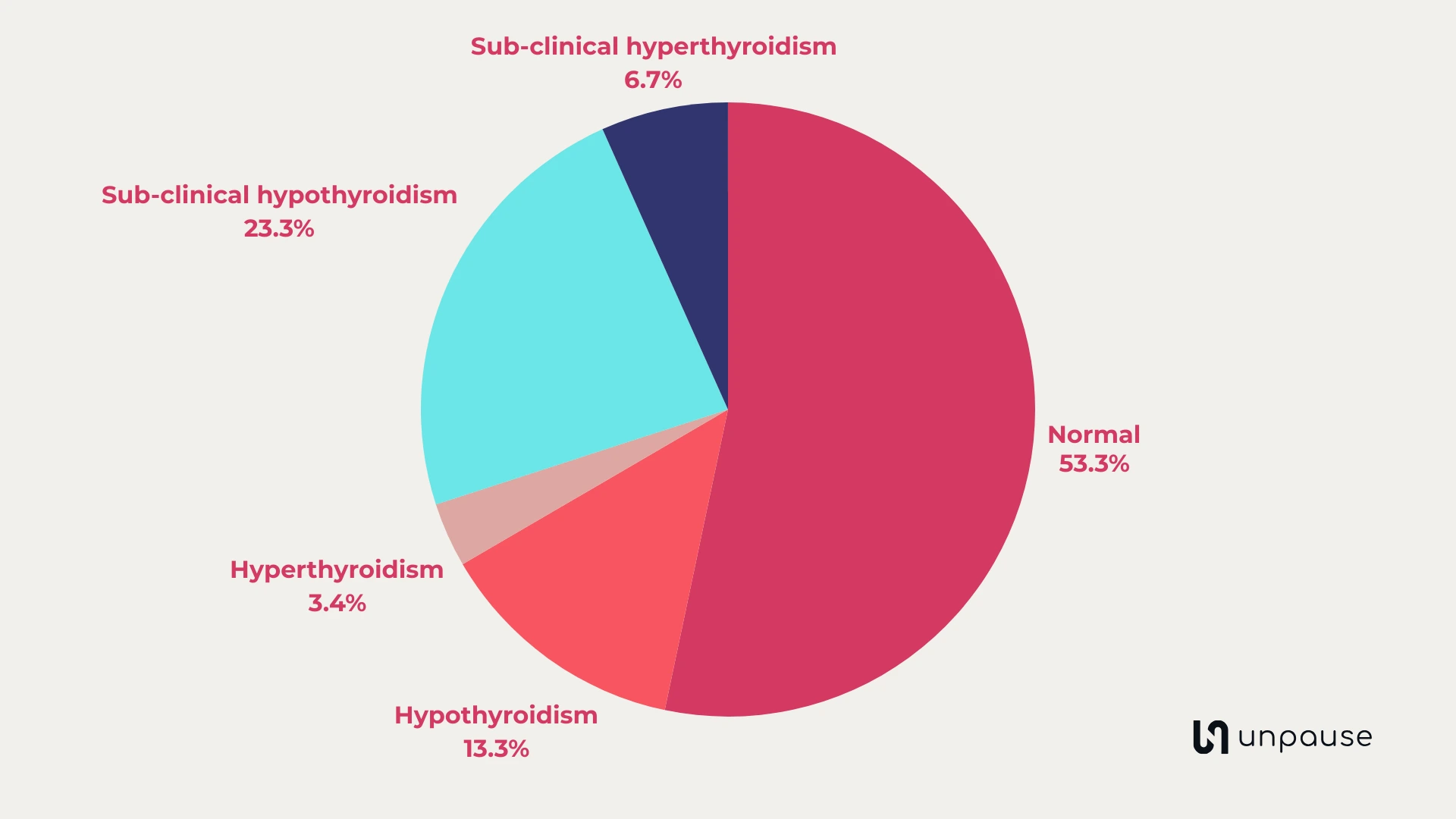Thyroid and Hot flushes – How are they connected and what are the effective ways to deal with them ?
October 20, 2024

What Is the Function of the Thyroid Gland?
The thyroid gland, a small butterfly-shaped organ located at the base of the neck, is crucial for regulating various bodily functions. It plays a central role in managing the body’s metabolism, growth, and development by producing several vital hormones, including:
- Thyroxine (T4): This hormone is primarily responsible for regulating metabolism and energy levels throughout the body.
- Triiodothyronine (T3): A more active form of thyroid hormone that influences nearly every physiological process, including heart rate and body temperature.
- Calcitonin: This hormone helps regulate calcium levels in the blood, playing a vital role in bone health.
Thyroid disorders can affect anyone, but research indicates that individuals assigned female at birth are significantly more susceptible to these conditions. This discrepancy highlights the necessity for awareness, early diagnosis, and proactive management of thyroid health.
How Do Thyroid Disorders Impact Female Health?
The influence of the thyroid gland extends to numerous systems in the female body, particularly the reproductive system. Understanding how thyroid dysfunction manifests in women can illuminate its profound effects on various life stages.
Thyroid Disorders and Their Effects on Puberty and Menstruation
During puberty, an imbalance in thyroid hormone levels can result in early or delayed onset of puberty and menstruation. Common menstrual irregularities associated with thyroid disorders include:
- Light or Heavy Menstrual Periods: Hormonal disruptions may lead to abnormal bleeding patterns.
- Irregular Menstrual Cycles: Women may experience variations in cycle length and symptoms.
- Amenorrhea: In some cases, women may stop menstruating altogether.
Furthermore, thyroid dysfunction can interfere with ovulation, especially in cases of hypothyroidism, leading to an increased risk of ovarian cysts. Severe hypothyroidism may even cause galactorrhea, or lactation outside of pregnancy, which can further impede ovulation.
Risks of Thyroid Disorders During Pregnancy
Pregnancy presents unique challenges for women with thyroid disorders. Both hyperthyroidism and hypothyroidism can pose serious risks to maternal and fetal health, such as:
- Pre-Eclampsia: A potentially dangerous condition characterized by high blood pressure and signs of damage to other organ systems, most often the liver and kidneys.
- Miscarriage and Preterm Birth: Hormonal imbalances can affect the stability of the pregnancy.
- Stillbirth: Severe thyroid disorders can increase the risk of fetal demise.
- Postpartum Thyroiditis: Women may experience thyroid dysfunction after giving birth, affecting their recovery and hormonal balance.
Additionally, hypothyroidism during pregnancy can lead to complications such as heart failure and excessive bleeding postpartum. Hyperthyroidism, on the other hand, may worsen morning sickness and increase the likelihood of complications like high blood pressure.
Early Menopause and Thyroid Health
Thyroid issues can also contribute to premature menopause. Symptoms commonly associated with thyroid dysfunction, such as hot flushes, insomnia, and mood swings, often mimic the onset of menopause. Addressing thyroid imbalances through appropriate treatment may alleviate these symptoms and delay the onset of premature menopause, significantly impacting a woman’s quality of life during midlife.
Moreover, an overactive thyroid can negatively affect bone health by depleting calcium, leading to conditions like osteoporosis, making it essential for women to monitor their thyroid function as they approach menopause.
Emotional and Mental Health Implications
Beyond physical health, untreated thyroid disorders can have a significant impact on emotional and mental well-being. Individuals with thyroid dysfunction may experience a range of psychological symptoms, including:
- Depression: Low levels of thyroid hormones are linked to feelings of sadness and hopelessness.
- Fatigue: Persistent tiredness can result from both hormonal imbalances and the body’s inability to regulate energy efficiently.
- Weight Gain: Metabolic disruptions may lead to unintended weight changes, affecting body image and self-esteem.
- Reduced Sexual Desire: Hormonal fluctuations can influence libido, affecting intimate relationships.
- Cognitive Difficulties: Some individuals may report issues with concentration and memory, often referred to as "brain fog."
Doctors can utilize TSH test results to identify thyroid disorders, including hypothyroidism and hyperthyroidism. The pituitary gland produces TSH, a hormone that stimulates the thyroid gland, which is a butterfly-shaped gland located in the throat. The thyroid produces hormones that play a crucial role in regulating various bodily functions, such as metabolism, heart rate, and body temperature.

This infographic has been created based on the study published in pmc.ncbi.nlm.nih.gov
Conclusion: The Importance of Prioritizing Thyroid Health
The thyroid gland may be small, but its role in maintaining the body’s metabolism, reproductive health, and overall well-being is monumental. For individuals assigned female at birth, thyroid disorders can disrupt key life stages—from puberty through menopause—impacting physical, emotional, and mental health.
Recognizing Symptoms and Seeking Help
Awareness of thyroid function and its far-reaching impacts empowers individuals to seek timely medical intervention. If you experience symptoms such as hot flushes, irregular periods, fatigue, or mood swings, consider consulting a healthcare provider for a comprehensive thyroid evaluation. Early diagnosis and personalized treatment can address underlying issues, paving the way for a healthier, more balanced life.
Empower Yourself with Knowledge and Action
Prioritizing thyroid health and adopting a proactive approach to managing symptoms can significantly enhance your well-being. Here are some actionable steps to consider:
- Educate Yourself About Thyroid Health: Understanding how your thyroid functions and its importance in regulating your body’s systems can motivate you to take charge of your health.
- Monitor Your Symptoms: Keep track of any changes in your menstrual cycle, energy levels, mood, or physical health. Documenting these changes can provide valuable insights for your healthcare provider.
- Regular Check-Ups: Schedule routine check-ups with your healthcare provider to monitor your thyroid function, especially if you have a family history of thyroid disorders or are experiencing related symptoms.
- Lifestyle Modifications: Implementing lifestyle changes can positively impact thyroid health. Consider the following strategies:
- Balanced Nutrition: Focus on a diet rich in whole foods, including fruits, vegetables, lean proteins, and whole grains. Nutrients such as iodine, selenium, and zinc play a crucial role in thyroid function.
- Regular Physical Activity: Engaging in regular exercise can help manage weight, reduce stress, and promote overall health, benefiting both thyroid function and mental well-being.
- Stress Management Techniques: Practices such as yoga, meditation, and deep-breathing exercises can help reduce stress, which may alleviate some symptoms associated with thyroid dysfunction.
- Social Support: Connecting with friends, family, or support groups can provide emotional support and practical advice for managing thyroid-related challenges. Sharing experiences with others facing similar issues can foster a sense of community and understanding.
- Consider Professional Help: If you are struggling with emotional or mental health issues related to thyroid dysfunction, consider seeking help from a mental health professional. Therapy can provide strategies for coping with the psychological impact of thyroid disorders.
Embracing Life’s Milestones with Confidence
By taking proactive steps to prioritize thyroid health, individuals can enhance their overall well-being and navigate life’s milestones with greater confidence and vitality. Understanding the intricate relationship between thyroid function and female health empowers you to take charge of your health, seek appropriate interventions, and ultimately embrace life with resilience.










































